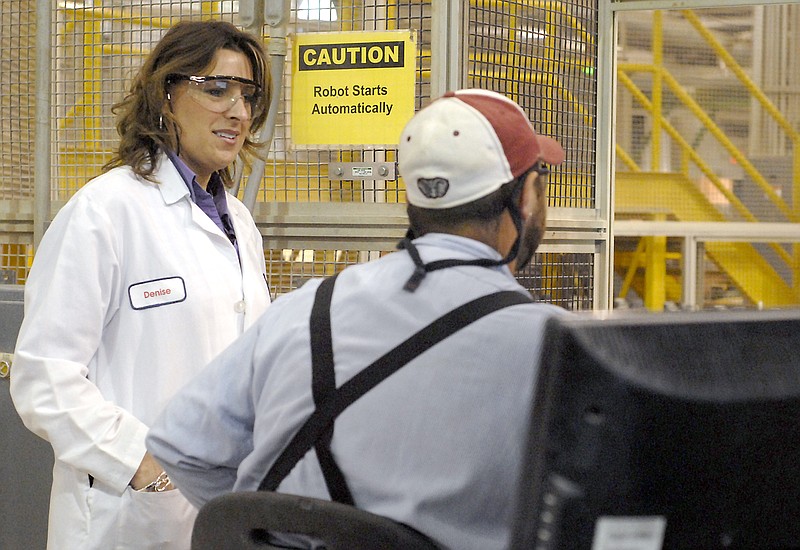Statistics show that only one out of every 10 engineers is a woman, but many of Chattanooga's female engineers say they hardly feel like a discriminated-against minority.
Holly Bean, a newly hired Volkswagen employee and the only female engineer out of 14 the company has hired locally, said that that although she had a few "incidents" with outside suppliers during her previous 10 years at Chrysler, it was never something she couldn't handle.
"At times it was challenging because of the stereotype of (where) women should work, and you had to prove you could do your job if you are a woman," she said. "Back in the '80s, women weren't even allowed on the manufacturing floor."
Female engineers now make up 11 percent of the total number of engineers, according to a 2007 report by the National Science Foundation, a figure that has grown by 5.3 percentage points since 1983.
A different view
Lulu Copeland, technical training manager at UTC, blames societal, parental and educational pressures that she says can affect young girls' perception about careers.
"Data shows that women have not gained ground in numbers in the engineering profession," Ms. Copeland said. "I have been coordinating engineering summer camps for the 13-plus age group for the last 10 years, and attendance is 90 percent boys."
This hasn't stopped women in the Chattanooga-area engineering field from pursuing their dreams.
Dr. Noelle Currey, acoustical engineer for Astec Industries, designs mufflers for the company's heavy machinery.
"I ended up being an acoustical engineer because I was involved in music at Girls Preparatory School," she said. "I was really good at math and science, and the music teacher mentioned acoustical engineering to me, so I just pursued it."
After getting into engineering by accident, she found that she was outnumbered by the men in her class "10 to two." That, however, failed to deter her.
"When I was in school, there were times when I was the only female in class," she said. "One professor had the nerve to tell me I got straight A's because I could bat my eyes."
Although she felt the comment was uncalled for, she let it go and said that she doesn't see much gender bias anymore.
"In terms of the bosses I've had, the places I've been, I don't experience that," she said. "I've run into some cases where once in a while it comes back to bite me that I am a female, but it's a rare instance."
Specialized support
From 1983 to 2007, the number of women in engineering and related fields increased from 242,000 to 358,000, while the number of men in engineering and related roles increased from 2.2 million to 2.3 million during the same period, the science foundation said.
Environmental planner Ashley Farless, a professional engineer, said that her employer, Arcadis, provides support in the form of the Women's Network of Arcadis for the increasing numbers of women entering the work force.
"The purpose (of the network) is to establish connections with other women, and provide an open environment to share resources and ideas," Ms. Farless said.
The group examines issues like work/life balance, communication styles, career planning and networking, but Ms. Farless also enjoys spending time in the larger co-ed groups like the American Society of Civil Engineers.
"I think that women's groups are effective, but I feel more connected if everyone else is invited," she said. "I don't personally feel like I need to separate myself."
She said the main hurdle for most women entering the field is the dearth of other females in the classroom. Once engineers enter the work force, they work side by side with members of other professions, rendering the gender imbalance in their own less noticeable, she said.
"When I was in college, it seemed more obvious that there were fewer female students than male students, but I kind of knew that going in, and I wasn't intimidated by that," she said. "I don't really think of it as an issue for me."
The ratio of male to female engineers hasn't changed much in recent years. Overall, 18 percent of Chattanooga State engineering graduates were female in the spring 2009 semester, according to Bonnie Riggs, assistant director for institutional research.
Seven percent of engineering graduates at UTC were women last year, said Richard Gruetzemacher, director of planning evaluation and institutional research at UTC.
Source of inspiration
Engineer Denise Rice of Cormetech rose through the ranks to become plant manager at Cormetech's Cleveland, Tenn., facility. She works with the Society of Women Engineers to help inspire girls to choose engineering early in life.
"One of the things we do is try to inspire other girls, and you have to start in high school," she said.
Ms. Rice, the only female engineer at the 125-employee plant, was personally inspired by her late aunt, an electrical engineer. Now Ms. Rice wants to give other women the same opportunity, by helping erect a support structure in their high school and college careers.
"I would not have considered engineering if I didn't have a role model," she said. "The real challenge now is how to inspire more women."

